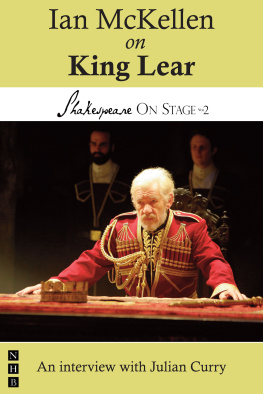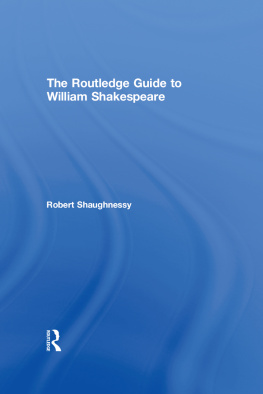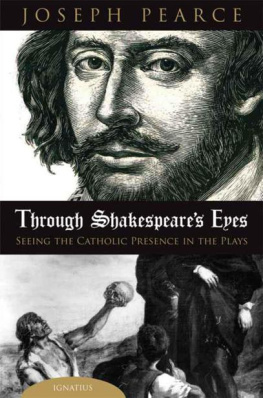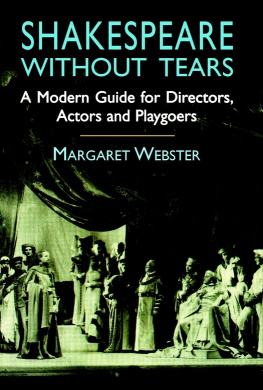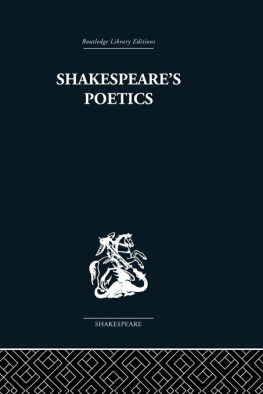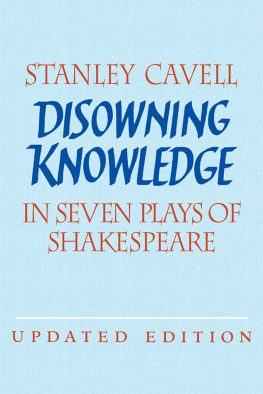Shakespeare
A Beginners Guide
ONEWORLD BEGINNERS GUIDES combine an original, inventive, and engaging approach with expert analysis on subjects ranging from art and history to religion and politics, and everything in between. Innovative and affordable, books in the series are perfect for anyone curious about the way the world works and the big ideas of our time.
africa | french revolution |
anarchism | genetics |
aquinas | global terrorism |
artificial intelligence | hinduism |
the bahai faith | history of science |
the beat generation | humanism |
biodiversity | islamic philosophy |
bioterror & biowarfare | journalism |
the brain | judaism |
british politics | lacan |
the buddha | life in the universe |
cancer | literary theory |
censorship | machiavelli |
christianity | mafia & organized crime |
civil liberties | magic |
classical music | marx |
climate change | medieval philosophy |
cloning | middle east |
cold war | NATO |
conservation | nietzsche |
crimes against humanity | the northern ireland conflict |
criminal psychology | oil |
critical thinking | opera |
daoism | the palestineisraeli conflict |
democracy | paul |
descartes | philosophy of mind |
dyslexia | philosophy of religion |
energy | philosophy of science |
engineering | postmodernism |
the enlightenment | psychology |
epistemology | quantum physics |
evolution | the quran |
evolutionary psychology | racism |
existentialism | renaissance art |
fair trade | shakespeare |
feminism | the small arms trade |
forensic science | sufism |

Shakespeare
A Beginners Guide
Ros King

A Oneworld Paperback Original
Published by Oneworld Publications 2011
This ebook edition published by Oneworld Publications 2011
Copyright Ros King 2011
The right of Ros King to be identified as the Author of
this work has been asserted by her in accordance with the
Copyright, Designs and Patents Act 1988
All rights reserved
Copyright under Berne Convention
A CIP record for this title is available
from the British Library
ISBN 9781780740485
Typeset by Jayvee, Trivandrum, India
Cover design by www.vaguelymemorable.com
Oneworld Publications
185 Banbury Road
Oxford OX2 7AR
England
Learn more about Oneworld. Join our mailing list to find out about our latest titles and special offers at:
www.oneworld-publications.com
For Tam and Ray
Acknowledgements
My thanks go to Marsha Filion at Oneworld for first suggesting and then helping to shape this project, and to Rachel Beaumont, for her patience and immensely helpful editorial suggestions. I am grateful too to the presss anonymous reader, to Bella Millett who read the manuscript at its final stage, and to countless students and actors whose responses to these ideas over the years have helped me refine and develop them.
Introduction: Why Shakespeare?
Yet, do thy worst, old Time. Despite thy wrong, My love shall in my verse ever live young.
(Sonnet 19)
Shakespeares plays and poems have survived both in print and on the stage for four hundred and fifty years. He is probably the most performed and reprinted poet and dramatist of all time. More than that, his work has encouraged constant quotation, reinvention, reinterpretation, translation, and rewriting since it first appeared; and not just in England or in Britain but across the world. My aim in writing this book is to explore some of the reasons for this, and also the reasons why, for many people, Shakespeare is a daunting hill to climb. This book is for people who enjoy Shakespeare and want to think about the reasons for that. It is also for people who have been put off him, by reputation or through the dreariness of having to mug up on selected scenes for the purposes of school examinations. I want to consider the plays and poems for their sensory and emotional qualities for pace and movement, sound and rhythm and for the social, ethical problems they present.
The cultural significance of Shakespeare means that he is too important to be left to the experts. And it is not the job of this book to give easy answers for beginners. Any attempt to do so would be to falsify his work and, paradoxically, would make it appear more rather than less difficult. I hope that I can persuade readers not to run from the difficulties they will find, or to dismiss them as simply the product of a different time or an archaic and outdated language. Rather they should be embraced as deliberate features of the language that demand our emotional response, and create the sense of human interaction that speaks to us across centuries despite enormous cultural changes. I am trying to describe how the plays work, not to nail down what they mean.
My aim is to offer observations on the ways Shakespeare structures his plays, and techniques for approaching his language. Throughout, I shall be using and demonstrating a multidimensional approach, which combines literary analysis, cultural history, and performance history, with practical performance considerations, and audience/reader responses. There are therefore a number of case studies of individual plays and poems dotted through the book; these should be read as demonstrations of dramaturgical close-reading techniques that can also be applied to other works by Shakespeare. It is not my intention to provide plot summaries or introductions for each of the plays in the canon, since these are readily available elsewhere.
Next page

